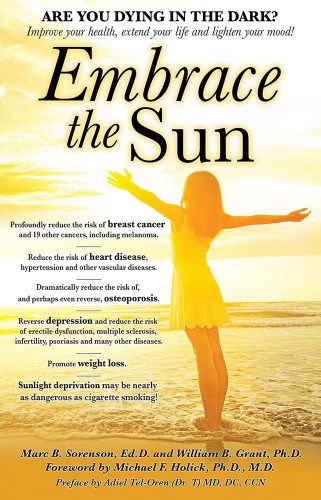The great outdoors, sun exposure and health. By Marc Sorenson, EdD.
The great outdoors, because of the sun, is magnificent! The UVB rays have returned to the sunshine in Saint George, Utah, and I have taken full advantage of them, sunbathing daily at midday. But In addition, the great outdoors furnishes so many advantages beyond our life-giving sunlight. Or does it? First of all, sunlight directly effects human health through stimulating the skin to produce photoproducts. Hence, such life-saving products as vitamin D, serotonin, endorphin, nitric oxide, dopamine and brain-derived neurotropic factor (BDNF) are increased. Furthermore, none of the other attributes of the great outdoors, such as the greenery and animal life, would be possible without the sun.
Recent research on the great outdoors
A recent study analyzed most of the health research that has been done on the benefits of the great outdoors.[1] The title of the research was: The health benefits of the great outdoors: A systematic review and meta-analysis of greenspace exposure and health outcomes. It was an analysis of 143 studies. The researchers showed impressive results from spending time in the great outdoors, especially the green great outdoors, known as greenspace.
Health expectations derived from enjoying the great outdoors:
- A reduction in diastolic blood pressure
- Decreased preterm birth risk
- A reduction in type two diabetes risk
- Decreased all-cause mortality
- A reduced risk of small size for gestational age
- Decreased risk of cardiovascular mortality
- An increased incidence of self-reported health
- Decreased incidence of stroke, hypertension, dyslipidaemia, asthma, and coronary heart disease
- Decreased risk of neurological and cancer-related outcomes and respiratory mortality
- Reduced negative emotions and fatigue
In addition, the authors noted that groups who exercised in the great outdoors had better health results. Indoor exercisers had results that were less than the outdoor exercisers. Thus, the great outdoors groups had significantly improved blood pressure, heart rate, fat percentage, BMI, cholesterol, depression and physical functioning.
While being in the great outdoors is exceptionally important to health, so is sunlight exposure. It is especially relevant that benefits enumerated for outdoor exposure are identical to those for regular, non-burning sun exposure. My new book, Embrace the Sun, delineates those healthful effects. It also cites research that indicates sun deprivation is as dangerous a cigarette smoking.[1]
Summary: Combine sun exposure with the great outdoors.
I opine that both safe sun exposure and exposure to the
great outdoors, are vital to health. So, it is best not to neglect either. Happy sunning!
[1] Lindqvist PG, Epstein E, Nielsen K, Landin-Olsson M, Ingvar C, Olsson H. Avoidance of sun exposure as a risk factor for major causes of death: a competing risk analysis of the Melanoma in Southern Sweden cohort. J Intern Med. 2016 Oct;280(4):375-87.
[1] Caoimhe Twohig-Bennett, Andy Jones. The health benefits of the great outdoors: A systematic review and meta-analysis of greenspace exposure and health outcomes. Environmental Research 166 (2018) 628–637.
[2] Lindqvist PG, Epstein E, Nielsen K, Landin-Olsson M, Ingvar C, Olsson H. Avoidance of sun exposure as a risk factor for major causes of death: a competing risk analysis of the Melanoma in Southern Sweden cohort. J Intern Med. 2016 Oct;280(4):375-87.
Vitamin D deficiency is increasing rapidly in spite of the fact more people are taking supplements than ever before. According to an article in the Daily Mail (UK), 75% or the U.S. population are deficient in Vitamin D, and among African Americans, 95% are deficient.[1] Recent research in the Journal of the American Osteopath Association places the blame for this deficiency squarely on two factors: (1) sun deprivation through sunscreen use, and (2) chronic diseases.[2]
The paper makes perfect sense. It is known sunscreen use can inhibit up to 99% of the production of vitamin D by the skin.[3] And of course, chronic diseases themselves may be the effect of sunlight/vitamin D deficiency. So, in trying to prevent sunburn and skin damage, we set ourselves up for a spate of illnesses.
Caution is the best prevention for sunburn. One should never stay out until the skin turns red, and in the beginning stages of sun exposure, one should gradually increase it until a tan develops. A tan is a sign the skin is protecting itself against burning. In a landmark paper published in 1993 in the journal Preventive Medicine, Dr. Gordon Ainsleigh stated, “As melanoma research has demonstrated, the best prevention is regular exposure, thereby maintaining a protective tan and high vitamin D blood and tissue levels.”[4] And we now know that sun exposure produces photoproducts beyond vitamin D, such as nitric oxide, endorphins, and serotonin. Staying out of the sun, or blocking its rays, are recipes for health disasters. Queensland, Australia has vigorously promoted sunscreen for decades, and Queensland now has one of highest rates of melanoma in the world,[5] along with a rate of vitamin D deficiency which is becoming critical.[6] The answer from the dermatologists, of course, is to prescribe more sunscreen and frighten more people out of the sun. Is that not the most counterintuitive decision of the century?
A much better choice than sunscreen is to simply leave the sun when it becomes too intense, or cover up with light, reflective clothing. Enjoy the sun, but do it carefully and never burn. And don’t destroy all the salubrious effects of the sun by using a noxious sunblock.
[1] http://www.dailymail.co.uk/health/article-4462730/Too-sunscreen-making-vitamin-D-deficient.html?ITO=1490&ns_mchannel=rss&ns_campaign=1490
[2] Pfotenhauer KM, Shubrook JH. Vitamin D deficiency, its role in heath and disease, and current supplementation recommendations. J Am Osteopath Assoc. 2017; 117(5):301 – See more at: http://www.ajmc.com/newsroom/sunscreen-use-chronic-disease-linked-to-vitamin-d-deficiency#sthash.Yfx4Rbny.dpuf
[3] Matsuoka LY, Ide L, Wortsman J, MacLaughlin JA, Holick MF. Sunscreens suppress cutaneous vitamin D3 synthesis. Journal of Clinical Endocrinology & Metabolism 1987; 64:1165-68.
[4] Ainsleigh G. Beneficial effects of sun exposure on cancer mortality. Preventive Medicine 1993;22:132-140.
[5] Garland CF, Garland FC, Gorham ED. Could sunscreens increase melanoma risk? American Journal of Public Health, Vol. 82, No. 4, April 1992, pp. 614-15.
[6]Van der Mei IA, Ponsonby AL, Engelsen O, Pasco JA, McGrath JJ, Eyles DW, Blizzard L, Dwyer T, Lucas R, Jones G. A high vitamin D insufficiency across Australian populations and latitude. Environmental Health Perspect 2007;115:1132-39.

